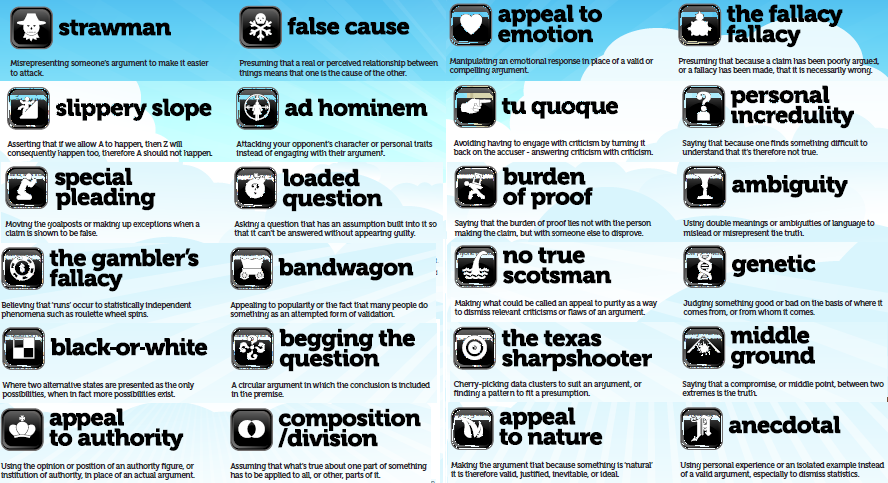Advertising companies are constantly using fallacious arguments in the presentation and the information held within their media.
A fallacious argument is an argument which is inherently flawed due to inconsistent logic, non-credible sources, and/or overreaching appeals to emotion.
Often advertisers use techniques which do this in very discrete ways, thus we as consumers should always be aware of fallacies in any rhetoric. Being conscious of fallacious arguments allows us to make good decisions, and to form sound arguments. The “Got Milk” advertisement featuring Dennis Rodman is an example of a fallacious argument which attempts to use the image of a sports athlete as an appeal to a false authority and bandwagon, as well as an either/or argument.
To begin with, the “Got Milk” advertisement shows an argument with a fallacious appeal to ethos, or credibility. One of these fallacies is an appeal to a false authority.
An appeal to a false authority as the title suggests means to cite a source which lacks the proper credentials or justification to make a claim due to a conflict of interest or absence of expertise or qualifications.
The “Got Milk” advertisement with Mr. Rodman attempts to have us blindly accept the information of drinking milk for a healthy body because a famous athlete is supporting the idea. Not only is this a clear example of an appeal to a false authority, but it blatantly creates a bandwagon appeal. A bandwagon appeal is a fallacious argument in which the claim urges its audience to accept the popular opinion without much conscious forethought. Together these appeals severely weaken the ethos of an argument which should bring the us to question the validity of any claim.
The “Got Milk” advertisement also uses an either/or argument, also known as a false dichotomy, a rhetorical fallacy of logos, or logistics.
A false dichotomy is an argument which gives its audience the illusion of only having two choices, one of which is almost always inherently negative forcing the audience to choose the positive outcome being argued fallaciously.
By using the image of Dennis Rodman’s athletic-healthy body in the “Got Milk” advertisement the company is giving an either/or argument which attempts to offer us the idea that we must drink milk in order to be fit and have a body with sex-appeal. This argument is false for a plethora of reasons, one of which being that not everybody is capable of drinking milk. Lactose in milk can disrupt an otherwise ordinary day for those who have an intolerance. According to WebMD, “When lactose moves through the large intestine (colon) without being properly digested, it can cause uncomfortable symptoms such as gas, belly pain, and bloating. Some people who have lactose intolerance cannot digest any milk products.” This source clearly provides evidence contrary to the false dichotomy conditioned by the “Got Milk” advertisement. By offering the either/or argument of drink milk or be unhealthy the “Got Milk” advertisement loses significant logic.
By thoroughly examining any sort of media we are capable of differentiating a sound argument from one which boasts fallacies.
The "Got Milk" advertisement with Mr. Rodman displays an appeal to a false authority, a bandwagon appeal, and an either/or argument as an example of a few of these fallacious arguments. Citing information without proper credentials, urging the audience to accept popular opinion, and providing only two options which forces the audience to accept our opinion only detracts from our argument as each is a rhetorical fallacy. Keep these ideas in mind when researching a product or when any kind of advertisement is being presented.
I have attached an image [not of my creating] which lists the rest of the rhetorical fallacies. Be certain to know the basics!
Works Cited
“Lactose Intolerance - Topic Overview.” WebMD. WebMD, Llc, February 08, 2017. pp. 1. http://www.webmd.com/digestive-disorders/tc/lactose-intolerance-topic-overview#1.
LOVELAUGHTER&&XHAOS
PALPABLE POPE Ypyskypo Skwyrl, the Y'sas
High Priest, Temple of Appled Thought
Alchemist for Trades

If you enjoyed this post, feel free to follow me and check out a few others while you're here!



